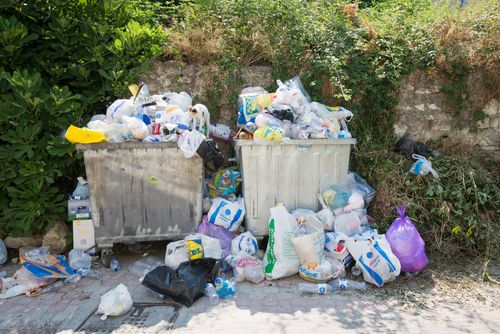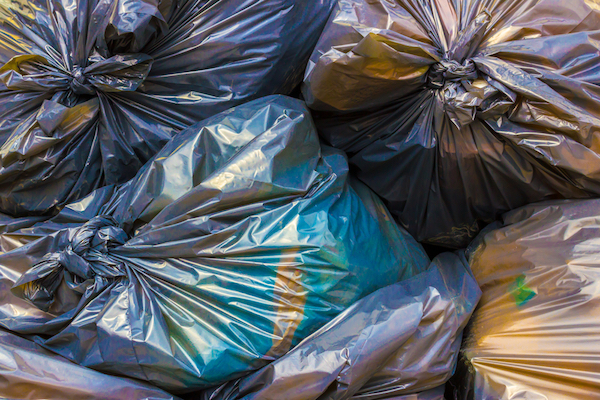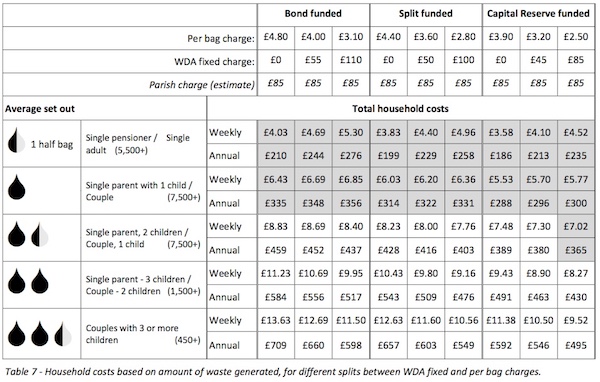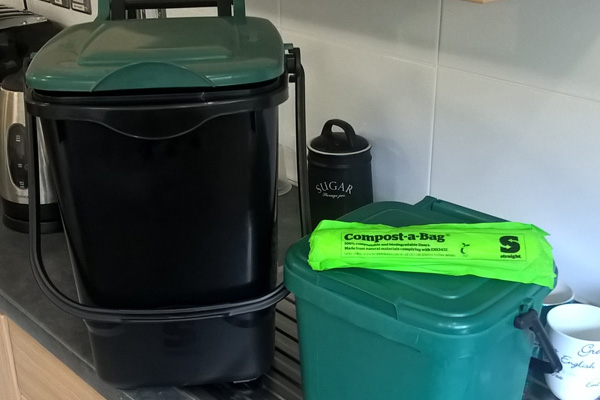

The options for the new user-pays charges for rubbish removal in Guernsey have been released with different suggestions for our deputies to consider before passing those costs on to us.
Options range from charging £2.50 per bag of rubbish plus an annual States fixed charge of £85 per household, or "a purely 'polluter pays approach'" that could initially cost between £3.90 and £4.80 per bag.
The island's new waste strategy is being implemented in stages throughout this year and next, with the States likely to decide next month how much each household pays for its waste charges based on those suggestions. The whole scheme is aimed at reducing the amount of rubbish generated.

The average cost per household is still expected to be within the previous estimate of £7.00 a week, which would cover all waste and recycling collections, the processing and export of materials for recycling, recovery or disposal.
The estimated cost includes £32 million that is currently being invested in new services and facilities to collect, process, and sort waste and recycling before the materials are exported for recycling, energy recovery or disposal.
However, the States may decide to fund that from the Capital Reserve which would reduce future waste bills by around £60 per household per year – which would bring down the estimated costs from an average of £7.00 a week to £5.90.
The alternative is a loan from the States of Guernsey bond, which will then be repaid from household and commercial waste charges over the next 20 years.
No date has yet been set for the new charges, but the changeover is expected to be in January or February 2019.
The new system will replace the current charging system, under which households pay parish rates, part of which covers the cost of waste collection and disposal. That charge is based on TRP and the average for 2018 is expected to be around £130. From next year, parishes will only charge for the collections while the States will then recover the costs of any subsequent processing, treatment and disposal.

Pictured: The options for waste charges in Guernsey and how it could impact on different sized families summarised. You can read the options in full here.
STICKERS
The ‘pay as you throw’ element will use prepaid stickers to cover the cost of collecting and disposing of ‘black bag’ waste.
The different options available could see either an annual flat charge per household, which would enable a lower bag charge, by recouping some of the fixed costs of the various waste and recycling services provided by the States; or a higher bag charge with a lower annual fee.
A number of options have been suggested by the Committee for the Environment & Infrastructure (CfE&I) and States’ Trading Supervisory Board (STSB), which will likely be debated by the States in April. You can read the options in full here.
Some problems with introducing the sticker system are already anticipated. In a joint statement issued by E&I and STSB, it is acknowledged that there is potential for some "significant behaviour change":
"The amount that will be recovered through the new pay as you throw charge will depend on the number of bags that are produced and paid for. The joint policy letter identifies there is still uncertainty regarding the assumption for this, due to the potential for significant behaviour change as a result of the new charges and other changes.
"To avoid a significant income shortfall in the first year, the proposals include an uplift on the initial bag charges. This will not affect the cost of the strategy, because any surplus or deficit would be adjusted for in subsequent years."

RUBBISH COLLECTIONS
Changes to Guernsey's rubbish collection systems will start to be introduced from the second half of 2018 so residents can "familiarise themselves" with the new arrangements before the new charges are introduced as well.
E&I and STSB said: "The new charging system will follow changes to the way household waste and recycling are collected, from September this year. This will give islanders time to familiarise themselves with the revised arrangements before the new charges come into effect.
"The changes include a new weekly collection of food waste, plus fortnightly collection of all other waste and recycling for the majority of homes. The only exception will be some homes in St Peter Port, which will have a weekly collection for general black bag waste. The new collections also include separate glass recycling."

Pictured: The food waste caddys which could be used island wide once Guernsey's new waste strategy is implemented
FOOD WASTE
Food waste will be collected weekly once the new waste strategy is introduced, with incentives for households to separate food waste from general black bag rubbish to lower their overall waste costs.
Caddys will be distributed for collecting food waste which will then be collected separately to general refuse. General black bag rubbish will be collected fortnightly in most areas of the island with E&I and STSB saying this will "encourage waste reduction and recycling, reduce overall collection costs, and help households minimise their waste bills."
Glass will be collected on alternate weeks to general waste, and the current blue and clear kerbside bag for other recycling will continue to be picked up fortnightly on alternate weeks.
Some of the more built-up areas of St Peter Port will have weekly collection for general refuse, but the frequency of other collections will be the same as the rest of the island.
WHEN?
The new collection arrangements will begin from 2 September, 2018, which is a few weeks before the new transfer station at Longue Hougue is due to start operations. A recent update from that site suggests it will be open on time, and within budget, and the introduction of the new services based there will be smooth.
That will be where waste from households and businesses is processed prior to being exported for energy recovery or recycling.
Homeowners are assured by E&I and STSB that everyone will be kept informed as the new systems and charges are introduced over the next year:
"A comprehensive communications campaign will be rolled out before the new collections start, to ensure all households are aware of the new arrangements and how they can use them. Reusable containers for food waste and glass will also be delivered to homes."
Comments
Comments on this story express the views of the commentator only, not Bailiwick Publishing. We are unable to guarantee the accuracy of any of those comments.